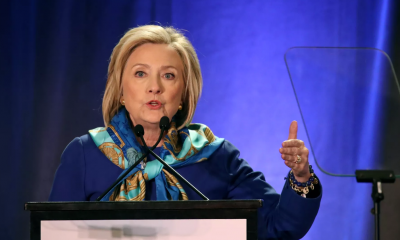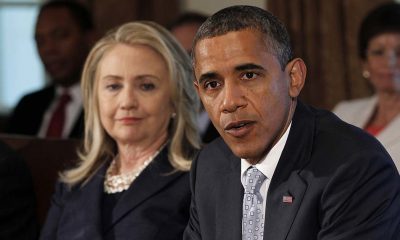World
Email saga brings fresh headache for Hillary Clinton

By Arun Kumar
Washington: Hillary Clinton may not be in legal trouble over the use of a private email server for official correspondence, but release of some 7,000 new emails with information redacted from 150 of them added to her political headaches.
Information was redacted from the emails because it has now been deemed to require classification, the State Department said Monday night as it released the material to meet a federal court direction to release 25 percent of Clinton’s emails by end August.
A State Department official said that the approximately 150 emails from Clinton’s four year tenure as Secretary of State that are being upgraded and subsequently classified are all at the “confidential” level – the lowest level of classification.
Newly classified emails include correspondence Clinton had with an aide about an Iran speech she delivered at American University in 2010, and another from the minister counselor for public affairs in Pakistan with the subject “Facebook Freed in Pakistan,” according to NBC News.
None are “Top Secret” as were two of the emails released last month, it said. In a 2010 note, Clinton asks colleague Philippe Reines if he can help her learn to use her new iPad, or “hPad,” as Reines dubbed it.
The Washington Post reported in March that Clinton used an iPad for emails, as well as a mobile phone. The report undercuts Clinton’s defence that she used a private email server so that she could carry just one device.
The Democratic front-runner in the 2016 presidential race has faced five months of criticism for using her own private server for official work.
State Department spokesman Mark Toner told reporters Monday that retroactive classification “certainly does not speak to whether (the information) was classified at the time it was sent or handled or however forwarded or received.”
“And we’ve always been very clear that nothing that we’ve seen so far was ever marked classified,” he said.
Toner would not say whether information from foreign government communications should have been classified at the time they were sent. Classification is “not often a black-and-white process,” he said.
“Our clear focus is on clearing these emails, redacting them as necessary in order to safeguard anything that we’ve deemed now should be upgraded in classification.”
The inspectors general for the State Department and the intelligence agencies have said they have found classified information in several work e-mails Clinton produced and expected to find more containing such material.
As part of its investigation, the FBI, according to the Post, has reached out to a Denver technology firm that Clinton hired to manage her server and to her attorney, who had kept a copy of her work e-mails on a thumb drive.
World
Lockdowns in China Force Urban Communities to Defy Censorship and Vent Frustration Online

Shanghai’s rich middle class is leading a wave of online dissent over the strict and prolonged lockdowns imposed in various parts of the country. Chinese internet censorship is struggling as patience is wearing thin in many urban centers, coming up with creative forms of online protests.
Social Media Posts Revealing Lockdown Tension in Shanghai
Drawn-out lockdowns are nothing new in China as authorities insist with the nation’s zero-Covid policy since the start of the pandemic. Currently over This time around, however, metropolitan areas like Shanghai are increasingly difficult to keep quiet, given that its more than 25 million residents have seen weeks of total isolation along with food shortages and many other service interruptions.
Dozens of towns and reportedly over 300 million Chinese citizens have been affected by lockdowns of different severity. As expected, urban netizens have been most outspoken over their difficulties by finding creative ways to get around state censorship and bans placed on topics, news comments and spontaneous campaigns.
Shanghai residents have been using mobile proxies and hijacking seemingly unrelated hashtags to talk about healthcare issues, delivery failures and the overall severity of their situation. The “positive energy” that the Chinese government wants to transmit during the recent prolonged series of lockdowns does not come naturally to those counting food supplies and online censors are working hard to filter words, trending topics and undesired social media sharing.
WeChat groups and message threads are under constant monitoring. Posts questioning the zero-Covid approach have been quickly deleted, including by leading Chinese health experts like Dr. Zhong Nanshan. Video footage is soon censored and protests and investigations are quickly made to disappear.
Where this has not worked, officials have exposed banners with warnings and outright threats like “watch your own mouth or face punishment”, while drones have been patrolling the city skies. Yet, if anything, this has led to further tensions and unspoken confrontation with Shanghai’s educated and affluent middle class.
Creative Online Solutions Harnessing Civic Energy
Announcements by Chinese social media that they would be publishing the IP addresses of users who “spread rumors” have not helped either. Tech industry research has shown that much of Asia’s tech-savvy population has a habit of using mobile proxies and other privacy tools, quickly finding workarounds to browse the internet freely and talk to the world about the hottest topics.
The sheer volume of forbidden posts is already a challenge for the very censorship system, experts explain. Unable to track all trending hashtags, state workers overlook topics that speak about the US, Ukraine or other popular news. Linking human rights elsewhere to their situation, Chinese online dissidents establish their informal channels and “hijack” the conversation to share personal or publicly relevant information about the Covid suppression in their town.
Sarcastic and satirical posts still dominate. Others hope to evade the censors by replacing words from famous poems or the national anthem. One thing is certain – social media, when harnessed with the right creativity, has proven its ability to mount pressure on the government in even some of the most strictly controlled tech environments like China.























